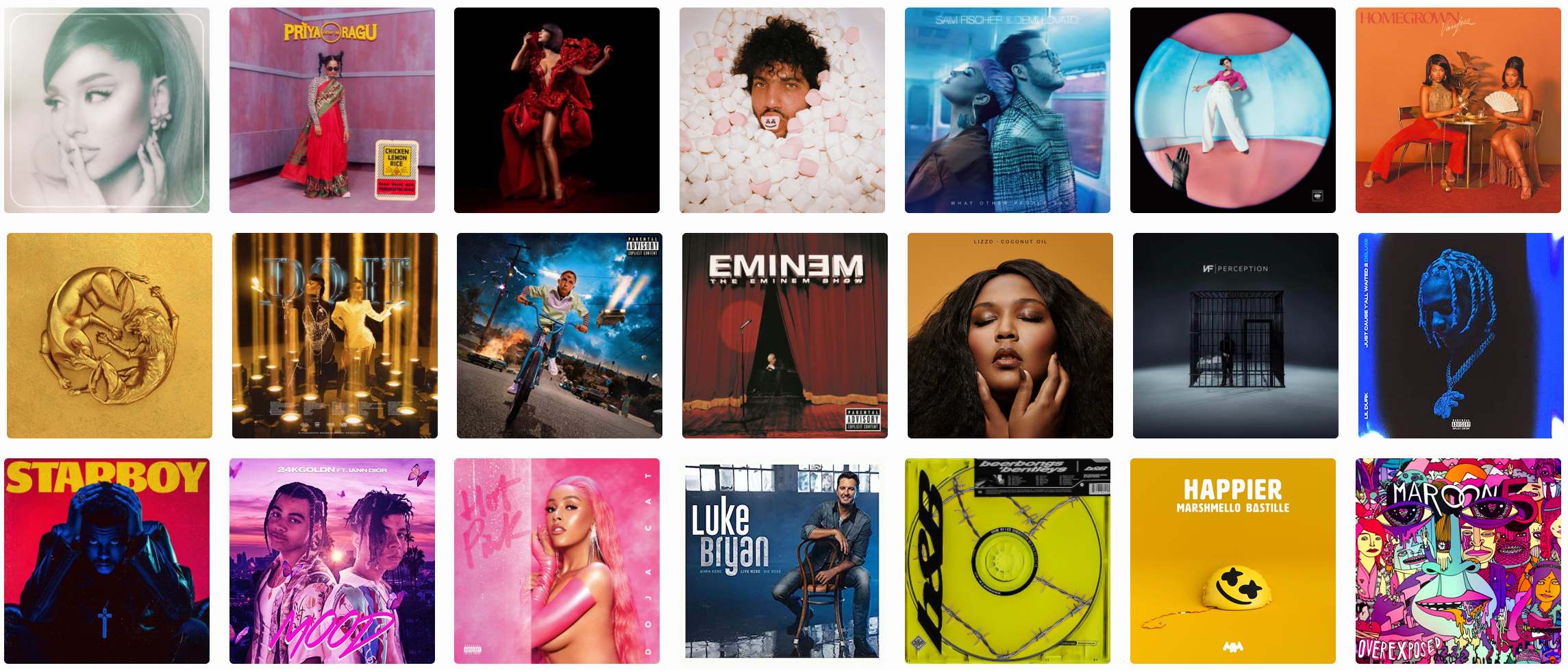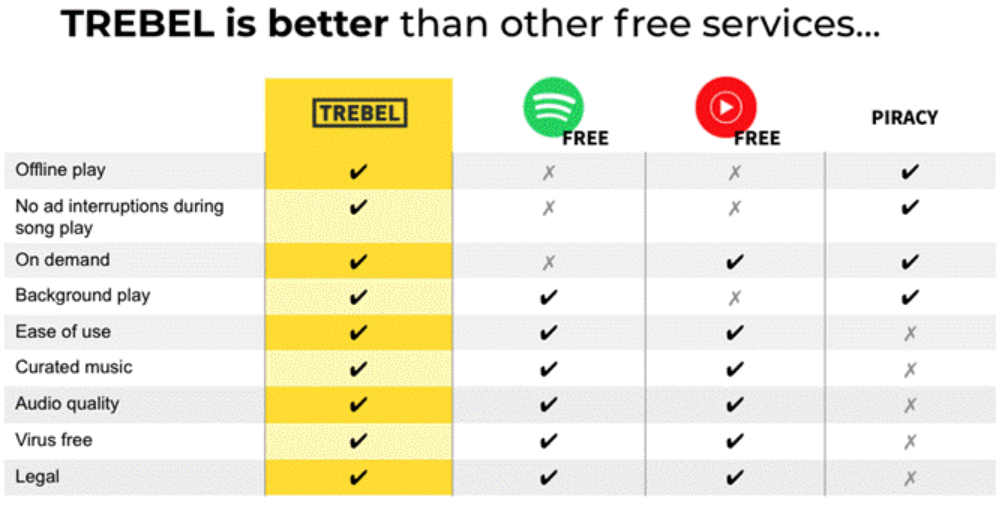Free Music App TREBEL Files For IPO, Hoping To Attract Millions of Pirates
For those who are currently pirating music on torrent sites, downloading tracks from YouTube-ripping services, or are simply unhappy with the playback restrictions of Spotify's free tier, TREBEL may be of interest. The company has filed for an IPO in the United States and is specifically targeting users who can't (or won't) pay for music.
When Spotify launched in 2006, the plan was to draw music pirates into a legal ecosystem that would render piracy less attractive while compensating the artists.
While both of those goals have been achieved, piracy is still the go-to option for millions of music fans and artists still have complaints that they are not being paid appropriately. In time these issues will have to be addressed but in the meantime, free music app TREBEL is hoping that it can play a unique part in the free streaming revolution.
After being a dark horse in the market for the past three years, TREBEL has now filed for an IPO in the United States and the SEC filing leaves absolutely no doubt who the company is targeting.
Ahoy Pirates and Stream-Rippers
TREBEL makes it crystal clear that the people it wants onboard do not currently pay for music, either because they can’t or simply won’t. The company says this audience amounts to more than three billion listeners, most of whom use music piracy sites and apps, or platforms like YouTube – “both of which deliver sub-optimal experiences for users and inequitable monetization for content owners.”
With the word ‘piracy’ appearing no less than 33 times in its SEC filing, TREBEL says its goal is to eliminate the need for people to use piracy sites, apps and stream-ripping platforms. That’s broadly the goal of other streaming services too, so how will TREBEL succeed in areas where Spotify and YouTube have fallen short?
The Business Plan
First off, this isn’t a shady operation culling tracks from dubious sources. TREBEL’s SEC filing reveals that the company is “supported by premium advertisers” and has “strong relationships” with the largest record labels in the world including Universal Music Group, Sony Music Entertainment, and Warner Music Group, who together hold 68% of the music recording market.

TREBEL says it generates revenue in three ways – display, video, and audio ads, in-app purchases, and branded experiences. At the moment, advertising is the cash cow, something it has in common with YouTube’s free tier but TREBEL believes it offers a much better experience by not inconveniencing the user.
Unique Features Aim to Boost User Experience
To begin, TREBEL says its ads don’t interrupt users’ listening experiences since they only appear when activities other than playing music are engaged in.
“TREBEL’s business model utilizes a well-established habit (in our user demographic) of searching, previewing, downloading, playlisting music then using those playlists to listen to their music offline,” its filing reads.
“TREBEL’s patented business model includes delivering advertisements when the user is engaging with the TREBEL Music app in non-music listening activities, such that, when the user listens to music, the listening experience is not normally interrupted by advertising.”
While that is a big plus, TREBEL has other tricks up its sleeve too. Unlike its rivals, TREBEL offers free offline listening by allowing users to download tracks to their devices for playback when they don’t have an internet connection. There are no track playback restrictions either, meaning that shuffle-mode isn’t mandated.
On top, TREBEL doesn’t require users to have their screens active when listening, meaning that background play can take place when screens are off or being used for other tasks such as texting or emails.

TREBEL’s Competition
As part of its SEC filing, TREBEL lists its competitors and the order in which they appear is telling. Right at the top the company cites ‘Digital Piracy’ as its primary competition, which makes sense since that’s the sector it is hoping to get its growth from.
“Stream ripping is the illegal practice of creating a downloadable file from content that is available to stream online. In recent years, it has become the most prevalent form of online music copyright infringement,” TREBEL says.
“While the exact scale and impact of digital piracy on our service is difficult to quantify, we believe that by offering a better user experience, we can successfully convert a significant number of stream rippers into TREBEL Music users.”
Second up is YouTube and the countless third-party platforms and tools that utilize its services. TREBEL acknowledges that it does not have the brand recognition of Google’s platform and according to its own data has nowhere near the library as things stand. However, TREBEL thinks it can succeed by offering a better experience, particularly when it comes to its uninterrupted and background playback features.
Finally, TREBEL addresses services like Spotify and Deezer. Again, TREBEL believes it can offer a better service by offering features that these platforms do not. The free tiers offered by its rivals do not offer offline listening, have restricted playback and skipping options, and interrupt users with ads.
“TREBEL solves these problems for users who are unable or unwilling to pay for subscriptions,” the company notes.
TREBEL’s Shortcomings
While there are plenty of good things to say about TREBEL, it does have significant shortcomings too. At the moment it has a library of 15 million songs, which is decent of course but nothing when compared to its rivals.
Of more concern, however, is its ability to reach users looking to convert.
At the time of writing, TREBEL is only available for download from the Apple App Store and Google Play Store in the United States and Mexico, and in the Huawei App Gallery in Mexico. This means (at least in ordinary terms) users in every other region will be denied access to the service.
The company says it has plans for international expansion beginning with Canada, Brazil, and other Latin American countries but at the moment, Europe and other regions do not get a mention. If TREBEL is to become a global name, this will need to be addressed.
Those interested in testing out TREBEL can do so here. SEC filing here
Free Music App TREBEL Files For IPO, Hoping To Attract Millions of Pirates
- aum
-

 1
1



3175x175(CURRENT).thumb.jpg.b05acc060982b36f5891ba728e6d953c.jpg)
Recommended Comments
There are no comments to display.
Join the conversation
You can post now and register later. If you have an account, sign in now to post with your account.
Note: Your post will require moderator approval before it will be visible.